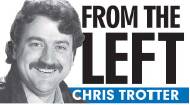David Farrar is discussing international population predictions made in "Death of the West" by Mark Steyn, based on current fertility rates. A couple of months back I wrote this
opinion piece about the domestic situation and how it is likely to be affected by our declining fertility rate and ageing population.
While near-hysteria abounds over peak-oil, bird flu, terrorism and global warming, scant attention is paid to the big story of this century. The one that will affect quality of life more than any other.
That story is our ageing population and declining fertility. But as subjects go, it's just not very sexy. Perhaps too, it is difficult to generate widespread interest when those of us old enough to recognise human mortality might just scrape through under the current system and the rest are in that lovely life phase where the idea of ageing is as remote as ..... time-travel.
But travel through time we do, at this point, in one direction only.
New Zealand has around half a million people aged 65 plus. That number will rise to 1.325 million by 2051 if Statistics New Zealand medium series population projections hold water. We can expect a 273 percent increase.
By contrast, the working-age population will only increase from 2.7 million to 2.9 million - a mere seven percent rise. And the number of 0-14 year-olds will actually decrease.
In all likelihood I will be dead by then but my children will not. On their behalf I did a few rough calculations. These are not scientific but if somebody better equipped wants to dramatically contradict my findings I would be absolutely delighted. Please make my day.
Making assumptions of no change in the Super qualifying age; the proportion of the working-age people on a benefit; the tax collected per head of the working population and rates of payment to pensioners and beneficiaries, the percentage of tax collected going on pensions and benefits will rise from 30 percent to 57.
That's the conservative scenario. What say unemployment doesn't stay at 3.4 percent? If the number of working-age people on all benefits reverts back to 15 percent (usual during the nineties) instead of the current twelve, then spending will increase to 61 percent.
Supporting the higher number are three other factors; one, Maori make up a growing percentage of working age beneficiaries as well as an increasing percentage of the population; two, the growth of single parent families is outpacing the growth of two-parent families and three, the seemingly unstoppable upward trend in sickness and invalid benefit uptake.
Next to consider is, most of us will spend most health dollars towards the end of our lives.
For arguments sake let's say two thirds of the health vote is spent on the elderly. That means today's $9 billion will have to grow to around $24 billion by 2051 (assuming we are happy living with extensive waiting lists.)
Now we have a problem. All of the tax the government has collected from its 2.9 million working age citizens has been spent on pensions, benefits and health and already there is a multi-billion dollar shortfall.
Of course there will be some relief coming from the Cullen Fund, if it survives and delivers. Just how much is debatable. Cullen says it will peak at 36 percent of super costs but other economists have put the peak pay-out as low as 20 percent. Even if it pulls us out of the red there is still the matter of education, defence, law and order, roading, etc to fund.
All of this points to a number of problems.
Raise tax, a lot. Question: are people more likely to want to come to a highly taxing country or leave it? There is a concrete limit to how much tax a government can squeeze out of the people. We may already have reached it. Further tax hikes will aggravate rather than solve the problem.
Significantly raise the age of retirement and means-test Super. But means-testing produces bad incentives. Those who try to plan and save for their old-age are penalised. And under growing taxation this becomes increasingly difficult. The productive population becomes resentful. More rats desert the proverbial ship.
Produce more children. Again it's hard to support a family under high taxes. Besides New Zealand already has higher fertility rates than most OECD countries. The trend however is down - not up.
Increase immigration. Can we attract more immigrants capable of making a positive contribution? Of course we can.
But we won't. Not until we recognise how just much we need them.
That realisation must dawn soon if the necessary political decisions are to be made. If we do care about our children's lives we must stop being precious about keeping the country sparsely populated so it is seen as a clean green get-away paradise. To give our kids a chance of living good lives in their birth country we must get over our irrational fear of foreign ownership
This seems counter-intuitive only because we refuse to face the facts. An increasingly impoverished country cannot look after its people, let alone the environment.
New Zealand needs to add a couple more million workers over the next fifty years. If we don't the only kind of paradise we will be living in is a fool's.












